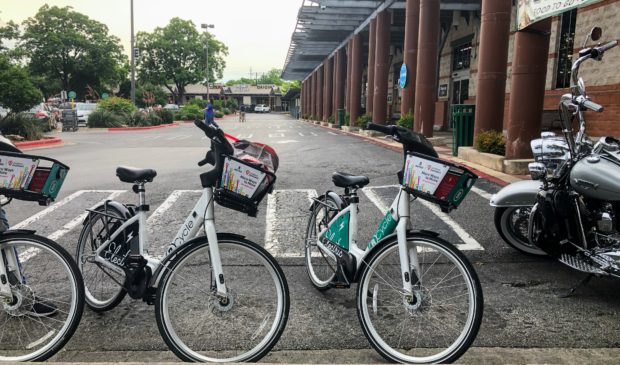Capital Metro board OKs MetroBike partnership for bus-oriented bike system
Wednesday, July 22, 2020 by
Ryan Thornton The city’s B-cycle program is set for expansion and rebranding this fall with the rollout of MetroBike, the Capital Metropolitan Transportation Authority’s concept for an integrated bike-share and public transit system.
The Capital Metro Board of Directors approved the MetroBike co-management partnership with the city of Austin and Bike Share of Austin in a 7-1 vote Monday, putting the bike-share on course for the first round of service area expansion this year. City Council approved its part of the agreement June 4.
“It’s a really big deal, we think, and the city of Austin agrees,” said Chad Ballentine, vice president of Demand Response and Innovative Mobility at Capital Metro. “More than just rebranding the existing system, we really envision it to be a highly visible program that allows us to partner in a new way with the city and make big changes in how people get around the community.”
Along with a handful of new MetroBike stations on existing and future transit corridors, the initial launch will include the rebranding of B-cycle bikes and stations with the new MetroBike brand, purchase of the 200 e-bikes currently on lease to the city, integrated bike-share and transit trip planning in the Capital Metro mobile app, and bundled passes for access to both transit and MetroBike with a single digital pass.
Under the agreement, Capital Metro and the city have each committed to contribute $250,000 in annual operational costs for the four years of the base contract. Both partners have also pitched in for a combined $500,000 in up front capital costs and upgrades.
For the short term, MetroBike will be co-managed under a partnership that intentionally “brings everyone into the fold,” Ballentine said. “This will likely adapt over the years – the partnership – but we thought it was important that everyone was involved at the oversight level right now.”
Capital Metro is taking over branding, planning and programming while the city has agreed to manage the right of way with wayfinding signage and bike paths and provide educational workshops. Bike Share of Austin will continue to maintain daily operations of the bike-share system.
“Since 2013, B-cycle has grown and adapted to meet Austin’s needs to reach the 75 stations and 500 bikes we have today,” said Diego Martinez-Moncada, CEO of Bike Share of Austin. “This new partnership will allow us to continue to evolve and expand upon our current offerings like the 200 e-bikes we’ve added to the fleet in our current pilot program.”
Capital Metro board members requested that the system expansion be given serious consideration for locations that have historically lacked access to the bike-share program as well as other public transit options.
“B-cycle has tended to be more in the central city and to some extent over in the east part of the city, but hasn’t had much of a reach,” Council Member Ann Kitchen said. “This could be useful in parts of town where it’s more like the circulator concept – in the sense that there are parts of town where it could be helpful for people to get to a bus stop, for example further south … B-cycle was never able to expand that far.”
Williamson County representative Eric Stratton encouraged the agency to consider expanding its reach up into his jurisdiction to encourage people to use transit routes like the Red Line commuter rail, which stretches all the way to the city of Leander.
“In some cases it’s not practical to put a 40-foot bus in a neighborhood,” Stratton said. “Well, in some cases it may not be practical to put a shuttle in a neighborhood, but we could put these bicycles there at a very reduced cost compared to what the cost of putting a bus there would be.”
Ballentine said Capital Metro has decided to work with a planning consultant to determine an equitable expansion strategy that meets the needs of residents with the greatest need for first- and last-mile connections to public transit. MetroBike stations will also be prioritized where there are planned or existing bikeways and in locations where active mobility groups have identified the highest demand.
The Austin Monitor’s work is made possible by donations from the community. Though our reporting covers donors from time to time, we are careful to keep business and editorial efforts separate while maintaining transparency. A complete list of donors is available here, and our code of ethics is explained here.
You're a community leader
And we’re honored you look to us for serious, in-depth news. You know a strong community needs local and dedicated watchdog reporting. We’re here for you and that won’t change. Now will you take the powerful next step and support our nonprofit news organization?









